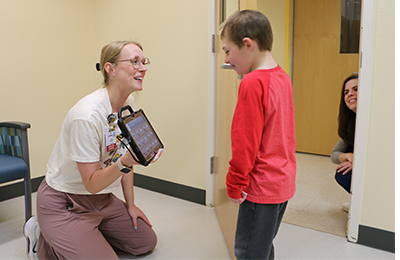It's Augmentative Alternative Communication (AAC) Awareness Month! This October, we asked AUCD Centers across the country to share the work they are doing to support AAC and AAC Awareness Month. Check out the stories below for an inside scoop into seven Center activities in AAC!
Michigan LEND Poster: Alternative and Augmentative Communication - What Is It? How Do I Use It?
This poster from Wayne State University's LEND Program shares essential AAC information including:
- What is AAC?
- How do people use AAC?
- Who uses AAC?
- What are examples of AAC use?
- Benefits of AAC
- Community programs in Michigan for AAC
- Frequently asked questions
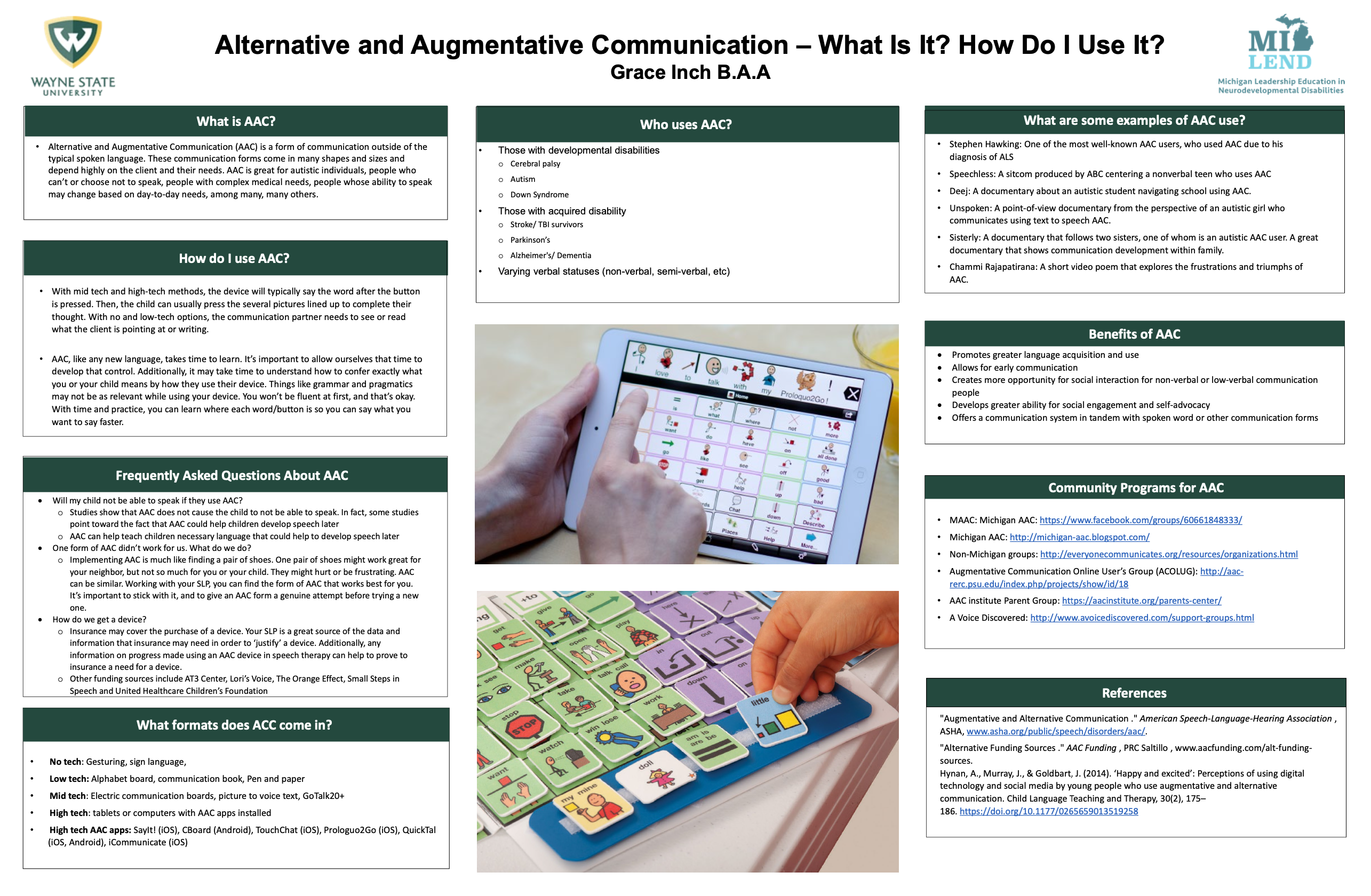
University of Wisconsin-Madison Waisman Center UCEDD AAC Program
The Waisman Center UCEDD’s Augmentative and Alternative Communication (AAC) Program is uniquely situated to contribute to increased AAC awareness through four pathways:
- Our interdisciplinary team of therapists provide direct AAC services in the Communication Aids and Systems Clinic (CASC).
- Our providers engage in consultative support in our Communication Development Program (CDP) which is aimed at increasing awareness for caregivers, support personnel, and general community members to foster environments that support AAC use, access, and language development.
- Our AAC Program staff are engaged in efforts to increase community speech language pathologists’ (SLP) capacity to provide AAC services through our Partnership Program. Our Partnership Program is in collaboration with the Wisconsin Department of Public Instruction, aimed at increasing school team capacity for supporting students who may benefit from AAC.
- Our AAC Program has an emerging and increasingly active research program with projects aimed at quality improvement and evaluating service delivery models, as well as understanding the lived experiences of providers, caregivers, families and individuals who use AAC. Focus groups with family members and providers have given us insight into the ways that our services and approach are working as well as areas for improvement, with our eye on forward progress we have modified aspects of our programs in response to feedback from these focus groups.
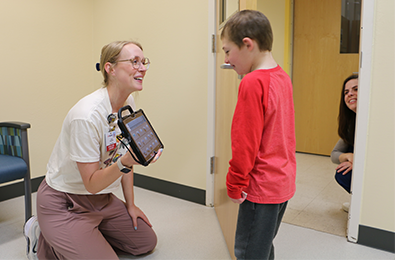
Additionally, we are active in two multi-institutional projects. One qualitative project is aimed at understanding transition challenges for caregivers and parents of adolescents and young adults who use AAC. We are excited to be active contributors and the AAC Program Director is a sub-committee co-leader in a nationwide call for establishing a peer support network for AAC users; this project is led by CommunicationFIRST and Oregon State Health Sciences University UCEDD.
LEND SLP trainees are integrated into all of our AAC work. While these activities are yearlong, each is grounded in the same spirit as October’s AAC Awareness Month, that of lifting the voices of the people we serve. Every effort and deliverable of the UCEDD’s AAC Program is deeply rooted in promoting AAC policy which we believe must be grounded in an inherent desire and understanding for the critical need to lift the voices of those with lived experiences in the context of AAC. We believe this is our way forward as a field; listening, learning, and improving our practice in response to conversations with our stakeholders.
University of Miami Mailman Center for Child Development International Augmentative and Alternative Communication Month Celebration!
Here at the University of Miami (UM) Mailman Center we honor, respect, and encourage ALL forms of communication. At UM we hire a variety of providers who advocate and support our local Miami community to facilitate and coach others on all forms of communication. In support of Augmentative and Alternative Communication (AAC) Month through the Florida Alliance for Assistive Services and Technology (FAAST), our state’s assistive technology program, we are hosting a celebration honoring assistive technology, including AAC, as well as celebrating the last 30 years of FAAST’s involvement and AT education within our state. All are welcomed and invited to this event, including community providers, current users of assistive technology, and any past clients who have been able to benefit from our services. During this event, we will also be providing free AT tool kits to the community to help advocate the use of AAC within activities of daily living. 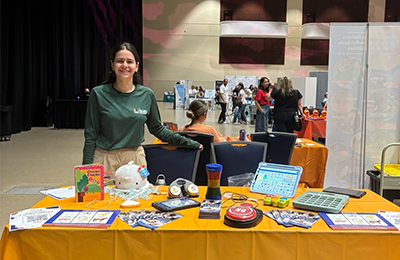
Furthering AT education and with the support of FAAST, our providers disseminate assistive technology information, trainings, demonstrations, and device loans to our local community at no cost year-round. Thereby promoting the use of AT, including AAC, so that all may be aware of our resources. At the UM we also house our augmentative and alternative communication (AAC) clinic where we have supported over 100 children and adults in obtaining their over AAC devices in the last ten years. When you have a team as dedicated to our community as ours is, every month is AAC Awareness Month!
For those within the area, please feel free to come and join us on October 22 at the University of Miami Mailman Center from 12 PM to 4 PM to celebrate AAC Awareness Month. If interested in attending, please RSVP.
AAC at the University of Kentucky Human Development Institute
The Human Development Institute at the University of Kentucky hosts externally funded projects related to communication and AAC use. The projects provide training in a variety of formats to educators and speech language pathologists as well as other related service team members who service students who use AAC. Specific activities include:
- ECHO in AAC – ECHO stands for Extension of Community Health Care Outcomes. Our ECHO team provides 10 webinar-based sessions that include a 20-minute teaching presentation, followed by a 30-minute case-study presentation. The ECHO team includes educators, speech language pathologists, occupational therapist, physical therapist, vision specialist, and audiologist. All webinar participants provide suggestions for AAC identification and implementation. Transcribed case presentations provide suggestions and resources to the presenter team and to the participants.
- Training webinars on a variety of topics related to effective implementation of AAC including Core Vocabulary, Selecting Communication IEP Goals, Communication Partner Training including Peer Supports, as well as planning and implementing communication and AAC.
- Asynchronous Training Topics on HDI Learning.
- We will be observing AAC Awareness Month.
Jeremy Legaspi, Arizona LEND Alum, Works to Engage AAC Users in Building a Wider Community
Speech-Language pathologists Jeremy Legaspi, Arizona LEND Alum, and Wylanta Jones recently created Camp Connect, a camp designed for young people who use Augmentative and Alternative Communication (AAC) Devices.
Jeremy described, "The goal is to create an inclusive and engaging environment where AAC users can build friendships, improve their communication skills, and connect with their community."
The camp, which ran for the first time this summer, was located in Prescott, Arizona. "It blends natural communication opportunities with community connections," says Jeremy. "This unique camp provides a chance for graduate students, therapists, and parents looking to strengthen their AAC skills while working alongside professionals and AAC users. It's an opportunity to develop deep, lifelong communication skills and connections."
Campers participated in various activities throughout the week including crafts, art, poetry, play, adapted sports, games, and more.
Video link with pictures of Camp Connect.
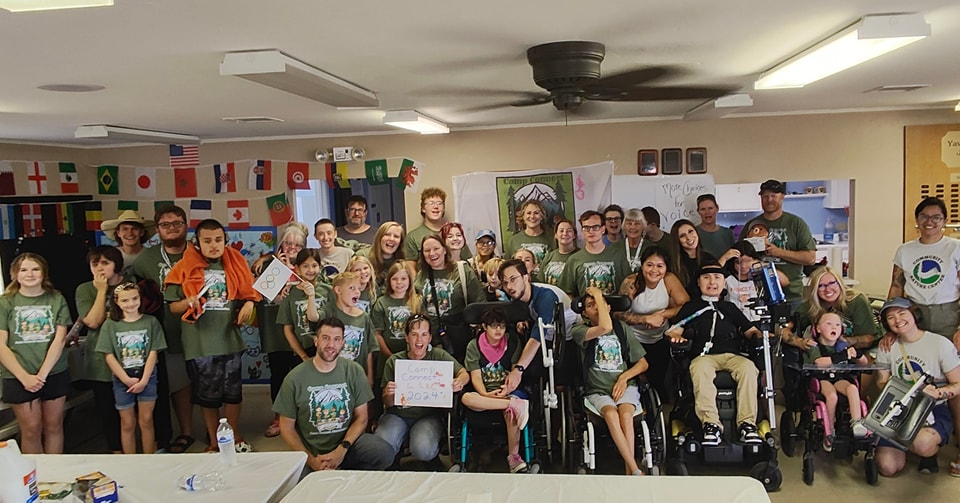
Children's Hospital Colorado (CHCO) Innovates Novel Clinical and Research Programs Utilizing Augmentative and Alternative Communication (AAC)
Research Programs:
Children's Hospital Colorado is a secondary site (Deborah Mood, PhD, site primary investigator) collaborating with Cincinnati Children's Hospital (Jareen Meinzen-Derr, PhD, primary investigator) on an innovative multi-site randomized control trial comparing technology-assisted language intervention (TALI) with traditional speech/language therapy for children who are deaf/hard of hearing (DHH) who communicate using spoken English. In this study, high-tech AAC is utilized uniquely, as a language teaching tool or a therapeutic support rather than a primary means of expressive communication. Results of the initial pilot trial indicated that DHH children receiving the AAC-supported (TALI) language therapy made significantly larger gains in spoken language outcomes, measured through language samples and standardized testing, compared to children who received treatment as usual (e.g., traditional speech/language therapy with no AAC) (Meinzen-Derr et al., 2021). Additionally, the intervention has demonstrated a promising impact on pragmatic language development (Mood et. al., 2022). A forthcoming publication explores emerging evidence suggesting that AAC-supported language intervention may moderate the impact of executive functioning difficulties to support language learning.
Clinical programs:
Children's Hospital Colorado boasts 22 AAC-trained speech/language therapists and 3 access-trained occupational therapists who serve children across Colorado (and via telehealth in California, New Mexico, Wyoming, Florida, and Pennsylvania). Services are provided in person at eight locations (six outpatient and two inpatient facilities) and via telehealth to extend care to underserved families in rural areas. We offer individual AAC and group therapy, as well as AAC evaluations. Recognizing the need to support communication partners of children who utilize AAC, we offer an extended weekend training program (First Steps Camp) for patients and families twice a year. In addition, to provide patients with the opportunity to attend a summer camp program with other children who rely on a speech-generating device to communicate, we offer a week-long (Talking with Technology Camp) experience for patients and siblings. Both camp programs are made possible due to the generous support from the Scottish Rite Foundation. Get more information on AAC camp programs.
As an additional resource for families and professionals, we developed short videos to teach various communication partner strategies for using AAC.
Furthermore, to celebrate International AAC Awareness Month, CHCO is offering our online 10-part education series “Augmentative & Alternative Communication (AAC) Allies: Strategies for Effective Communication!” for free (usually $250 for professionals/$80 for students/parents) throughout October. This program is offered for 13.5 hours (1.35 ASHA CEUs; Intermediate Level; Professional). Register today.
Oregon Health & Science University UCEDD for AAC Awareness Month
The OHSU UCEDD has much to celebrate for AAC Awareness month:
- As UCEDD co-director, Dr. Melanie Fried-Oken has conducted research into AAC for the past 40 years, leading teams for assistive technology development, intervention planning, AAC peer support models, assessment protocols for both children and adults, and AAC self-advocacy. The UCEDD has completed a number of AAC externally funded projects that address public health, device development and evaluation, interventions for young children.
- Dr. Emily Quinn (UCEDD faculty) is an NIH-funded researcher with additional support from the DOE Institute on Educational Sciences, who addresses AAC intervention for children with developmental disabilities in early intervention and coaching parents how to teach AAC to their young children, in rural communities, through telehealth, and in classrooms or homes.
- Dr. Charity Rowland, former UCEDD faculty, developed the Communication Matrix, an assessment tool to help families and professionals easily understand the communication status, progress, and unique needs of anyone functioning at early stages of communication or using AAC.
- Ms. Jan Staehely, a self-advocate who relies on AAC herself and is UCEDD staff, has a long-running blog on the UCEDD website. She has contributed to many UCEDD projects, including education in the OHSU Physician Assistants program on how to conduct medical examinations with people who rely on other forms of communication. We have a set of AAC resources for professions and the public available.
- The UCEDD has completed a set of training videos on how AAC users can schedule and participate in telehealth appointments with their providers (funded by the WITH Foundation).
- The UCEDD designed a website where researchers can get annotated bibliographies about the cognitive demands of AAC.
- Dr. Fried-Oken was a member of the RERC on AAC (NIDILRR-funded Rehabilitation Engineering Research Center on AAC) for 10 years, and has led an NIH-funded assistive technology research lab in the development and evaluation of brain-computer interfaces for people with severe speech and physical impairment for the past 15 years, involving the UCEDD in all her work. She is author of the book “Speaking Up and Spelling It Out,” which includes 34 chapters written by people who rely on AAC and their lived experiences. Ms. Staehely, a UCEDD AAC self-advocate, wrote the prologue to this book.
- Over the years, the OHSU UCEDD’s Community Partners’ Council (our consumer advisory board) has included many individuals who rely on AAC, thus increasing our capacity to include members of the community and their unique forms of communication in our advocacy work.
- The UCEDD (Dr. Fried-Oken, PI) has a 2024 contract with AUCD to develop recommendations for a national AAC Peer Support model.
West Virginia University Center for Excellence in Disabilities
At the WVU CED we have the Communication Access and Assistive Technology (CAAT) Clinic which provides consultation, training and resources for individuals who have difficulty being understood using speech. Professionals working in the clinic work collaboratively with clients, their families and other support professionals to identify areas of need to improve communication. We provide services to individuals of any age with a range of disabilities.
The services we offer are:
- Augmentative and Alternative Communication Consultations
- Support Services
- AAC communication partner training
- AAC system and vocabulary technical assistance (troubleshooting)
- Workshops, trainings and webinars (based on requested need)
Please follow the link to the CAAT clinic if you'd like to learn more: https://cedwvu.org/caat/.








